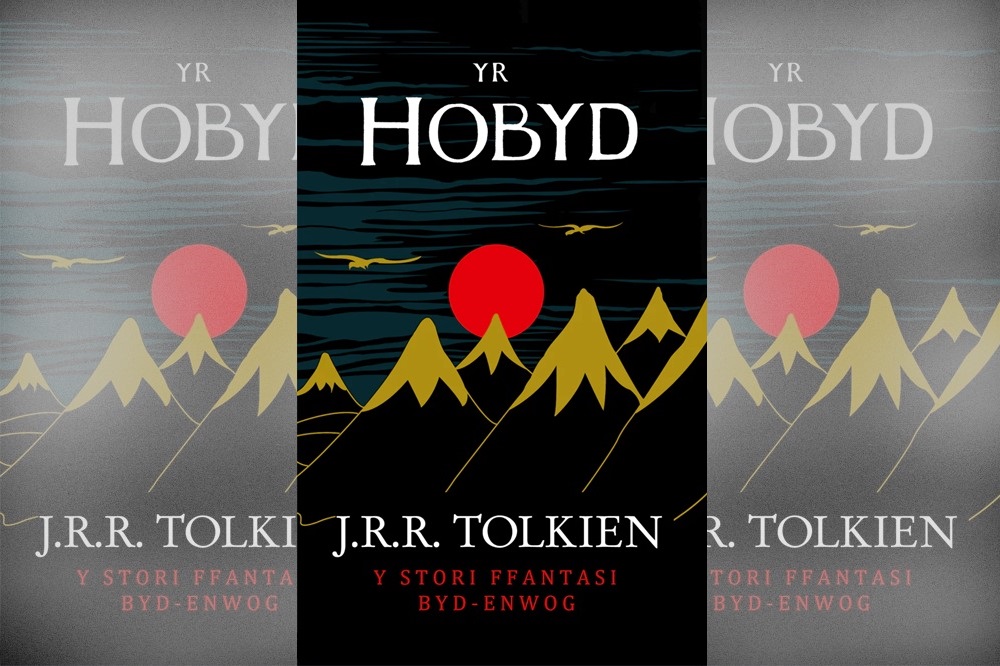Book review: Yr Hobyd by J.R.R. Tolkien

Ant Evans
“Welsh is of this soil, this island, the senior language of the men of Britain; and Welsh is beautiful”.
The above quote, taken from his lecture “English and Welsh” at the University of Oxford in 1955 leaves absolutely no ambiguity as to the feelings of John Ronald Reuel Tolkien towards the Welsh language.
He was so enamoured with the language in fact, that Welsh helped inspire the creation of the Elvish language, Sindarin.
The Hobbit has been translated into many languages over the years, including French, German, Mandarin, Icelandic and Breton (a sister language to Welsh). Indeed, some languages, such as French, have received more than one translation.
However, despite Tolkien’s fondness for the Welsh language, it wouldn’t be until 2024 that a Welsh translation of his classic fantasy novel, under the name “Yr Hobyd”, courtesy of Adam Pearce, Llyfrau Melin Bapur, would see the light of day.
Elves
When it comes to translating any text, what to translate and what to leave as it was in the original is an all important consideration. As the title gives away, the word for Hobbit has been translated. Although his first name has been left untouched, our protagonist Bilbo’s surname is now Baglan, and to correspond with Welsh spelling and pronunciation rules, the spelling of Gandalf’s name has been altered to Gandalff.
Bilbo’s address of Bag End has also been translated to Pen y Bag. The names of dwarves and elves on the other hand, taken to be from their own respective languages, have been left untouched. Placenames and landmarks, such as Laketown (Trellyn) and the Lonely Mountain (Y Mynydd Unig), have been translated into Welsh.
Wizard
The plot very much demands that Bilbo step out of his comfort zone in a pretty big way. Initially, Bilbo lives a quiet and comfortable life in his Hobbit hole, with the reader getting the impression that he’d like to keep it that way. Yet one fateful day, his uneventful life is turned upside down with the arrival of the wizard Gandalff (who he fails to recognise at first, until he introduces himself) and (on a follow up visit) thirteen dwarves wishing to take Bilbo on a journey to claim the treasure of Smawg, a large and dangerous dragon. Why Bilbo? Because Gandalff had assured the dwarves that the unsuspecting Bilbo was a skilled thief.
Goblins
Quite the way to get your life turned upside down then! Despite having lived a rather sheltered existence before the story’s starting point, Bilbo proves himself to be quite adept at stealing. An excellent example of this is when he’s trying to reunite with his travelling companions after a rather unpleasant run in with some goblins. As he wonders around trying to find his companions, Bilbo finds a ring, which makes the wearer invisible. After a rather tense encounter with Golwm, (who the reader quickly realises had hidden the ring before Bilbo pocketed it) involving a battle of riddles, each attempting to outdo the other, Bilbo eventually escapes and reunities with the others.
Giant spiders
There are also various other encounters where Bilbo must put his bravery to the test, including a battle with giant spiders who attempt to kill and eat the dwarves! Without a shadow of a doubt, Bilbo’s previously quiet existence is very much consigned to the past during the course of his journey to Y Mynydd Unig and encounter with Smawg, not to mention the events which unfold afterwards.
A quick note about the dialogue, Pearce seems to have made an attempt to ensure that no one dialect of Welsh dominates here. However, I will note that the trolls, named Hicin, Siencyn and Siac in the translation, almost sound as though you could expect to find them with a pint in hand in the Four Alls in Caernarfon!
Having first read the English original quite a few years ago now, one question was at the back of this reviewer’s mind whilst reading Yr Hobyd; does this read like a translation? Had you handed me the text alone, without the author’s name and told me this had been published in Welsh originally, had I not read this in English first, I might well have believed you! Which leaves me with one final question; can we expect a Welsh language translation of Lord of the Rings? If so, I’m very much looking forward to it.
For any Welsh speaking fans of Tolkien, including those who are learning if you feel confident enough, Yr Hobyd is very much worth your time.
Yr Hobyd by J.R.R. Tolkien, is published by Llyfrau Melin Bapur and is on sale from them priced at £14.99+P&P; it will also shortly be available in a range of bookshops across Wales including Cant a Mil and Caban (both Cardiff), Awen Meirion (Y Bala), Tŷ Tawe (Swansea), Siop Lyfrau’r Hen Bost (Blaenau Ffestiniog), Courtyard Books (Llangollen) and others.
Support our Nation today
For the price of a cup of coffee a month you can help us create an independent, not-for-profit, national news service for the people of Wales, by the people of Wales.






It’s also available in Cornish as An Hobys translated by Nicholas Williams. Cornish also has two translations of the War of the Worlds by HG Wells, Gwerryans an Planettys by Nicholas Williams and Bresel an Bysow by Steve Harris.
Mae’n siwr fod yna farchnad i’r math yma o beth,ond nid fi.